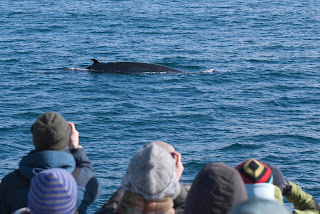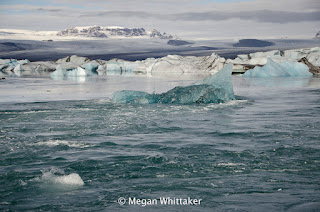
Thursday, December 20, 2012
Monday, November 5, 2012
Winter Whales
Just looking through my winter whale watching photographs for another project and thought I would kill two birds with one stone by putting them on here to.
 |
| Passengers watching Orca in the Icelandic winter sun. |
.jpg) |
| Humpback Whale rolling |
 |
| A male orca with the snow capped mountains and Hafnafjordur in the background. |
.jpg) |
| Humpback Whale fluking with snow covered Hafnafjordur in the background. |
 |
| A large male and juvenile Orca exhaling in the winter sun |
 |
| Passengers watching a Humpback Whale on a snow covered boat. |
Thursday, November 1, 2012
WhaleFest 2012
I was again invited to travel with my Icelandic family to WhaleFest 2012 at the Hilton in Brighton. The same place that everyone came together 30 years ago and made the moratorium happen. Of course there are obstacles still to hurdle and IFAW, WDCS, WWF, GREENPEACE and SEA SHEPHERD amongst others have done amazing things since then to minimise these obstacles. Still new ones are always arising.
.JPG) |
| The Elding gang |
.JPG) |
| Me with my idol Ingrid Visser and Planet Whale co-founder Dylan Walker. |
Unfortunately wild cetaceans are still being captured for aquariums worldwide, take Morgan for example. An orca that was highly emaciated when found in the Wadden Sea and was only meant to stay in captivity until she was fit enough to be released but now finds herself in a pool in Loro Parque, Tenerife. This can all turn around though as today a court committee discussed the fate of Morgan. Keep posted at http://www.freemorgan.org/.
 |
| Once again protesting for the protection of cetaceans everywhere in the same location as protestors from around the world came 30 years ago when the moratorium was signed. |
 |
| A picture of a Hectors Dolphin, a close cousin to the Maui's Dolphin. The most endangered marine dolphin in the world. |
Only 55 Maui's dolphins are left along a small fraction of the North New Zealand coast. A victim to gill netting and trawling within their habitat. As they are a coastal endemic species too, only residing in waters around NZ of less than 100m its a limited habitat already. The NZ government has opened a public consultation on new protection measures. This finishes on the 12th November so sign the petition now at www.hectorsdolphins.com.
 |
| Rannveig and Vignir with Erich Hoyt whom was there to talk about making the Southern Ocean Whale Sanctuary a true sanctuary in reality and not just on paper. |
In 1994 the International Whaling Commission (IWC) established a whale sanctuary in the southern ocean for whales however, whaling is still being continued here under the guise of "scientific whaling" and fish stocks are still being harvested. Last month (October) there was a meeting by the Commission for the Conservation or Antarctic Marine Living Resources (CCAMLR) to decide what areas should be safe-guarded. The Antarctic Ocean Alliance is asking for 3.6 million square kilometres of the Ross Sea and surrounding areas to have full protection. Stay posted at http://www.asoc.org/issues-and-advocacy/antarctic-wildlife-conservation/southern-ocean-whale-sanctuary
Lets hope that this year will mark the release of Morgan, better protection measures for Hectors and Maui's Dolphins and also the total protection of the Southern Ocean Whale Sanctuary. Then we can tackle the challenges of next year together. Hopefully stopping the whaling also in Iceland :)
Tuesday, October 16, 2012
Northern Lights and the Imagine Peace Tower
The Northern Lights are incredible at the moment and last night was the second in a row where you could see them from the Capital.
Monday, October 8, 2012
ICELAND WHALE WATCHING VS WHALING
As a British Marine Biologist living in Iceland on and off now for
over 4 years and working for one of the leading whale watching companies in
Europe, Elding Whale Watching Reykjavik, I have seen and experienced the
tiresome arguments between pro whaling and anti whaling countryman and
foreigners. I have always been a firm believer that you support organisations
in such countries where species need protection. Thus, I would like my part to
be about informing visiting tourists of the issues before arriving so that they
don’t fall into the trap that many do which is, it’s ok to eat whale meat when in
Iceland because it’s not!
We had a stall at the Whalefest in Brighton 2011 in which whale
enthusiasts frequently asked us about whaling in Iceland and even some, before
talking to us, had said that they refused to come to Iceland because of the Whaling.
This is something we want to change and so here I am telling you that by coming
to Iceland and going whale watching you would be doing more to stop whaling
that not coming at all.
Unfortunately, to increase the market, whalers are targeting
tourists and pushing whale meat as a traditional dish that should be tried. 100
restaurants around Iceland now serve Minke Whale meat. What is worse is that
many passengers that come whale watching have also tasted them either before or
after the tour. The answer frequently given to why they ate the meat is that
“it’s dead anyway so if I don’t eat it, someone else will” not really
understanding that its fuelling the industry to catch more. Many passengers
just say, “I ate one of those earlier” when pointing to the whales, not knowing
that they did wrong and of course “it’s a traditional dish and I just wanted to
try it”. It is mainly the tourism industry that keeps
the market afloat as a poll conducted by IFAW in 2010 indicated that only 5% of Icelandic households eat whale
meat weekly.
There
are two main debates here in Iceland. The inhumane killing debate one example
being in 2005 when 5 out of 39 Minke Whales were hit by a harpoon and lost or that only a small part of the whale is utilised the rest thrown back in the bay and second the socio-economic debate, which is the main driving force on the anti
whaling side.
Whale watching in Iceland has grown exponentially over the last two decades
from about 100 tourists going whale watching in 1991 to 125,000 in 2010 and
2011. We have observed that Minke Whales
are becoming more elusive even though we are seeing the same whales returning year
after year. Their lives are threatened in the same bay where they are watched
with awe. The increase in whale watching in Faxaflói Bay has
allowed for a safe area, which is currently being considered for expansion, but
as soon as whales cross this line they have to fend for themselves.
So
in summary, don’t miss out on the breathtaking scenery, wildlife, culture and
northern lights of Iceland. Go whale watching and state to the restaurants that
you’re not eating there because they serve whale. Help us to stop whaling and
as IFAW campaign states “Meet us don’t eat us”.
How would you like to see a whale?
Top two pictures photographed by Andri Þór Steingrímsson
Sunday, September 30, 2012
Jökulsárlón take 2
Subscribe to:
Comments (Atom)






















